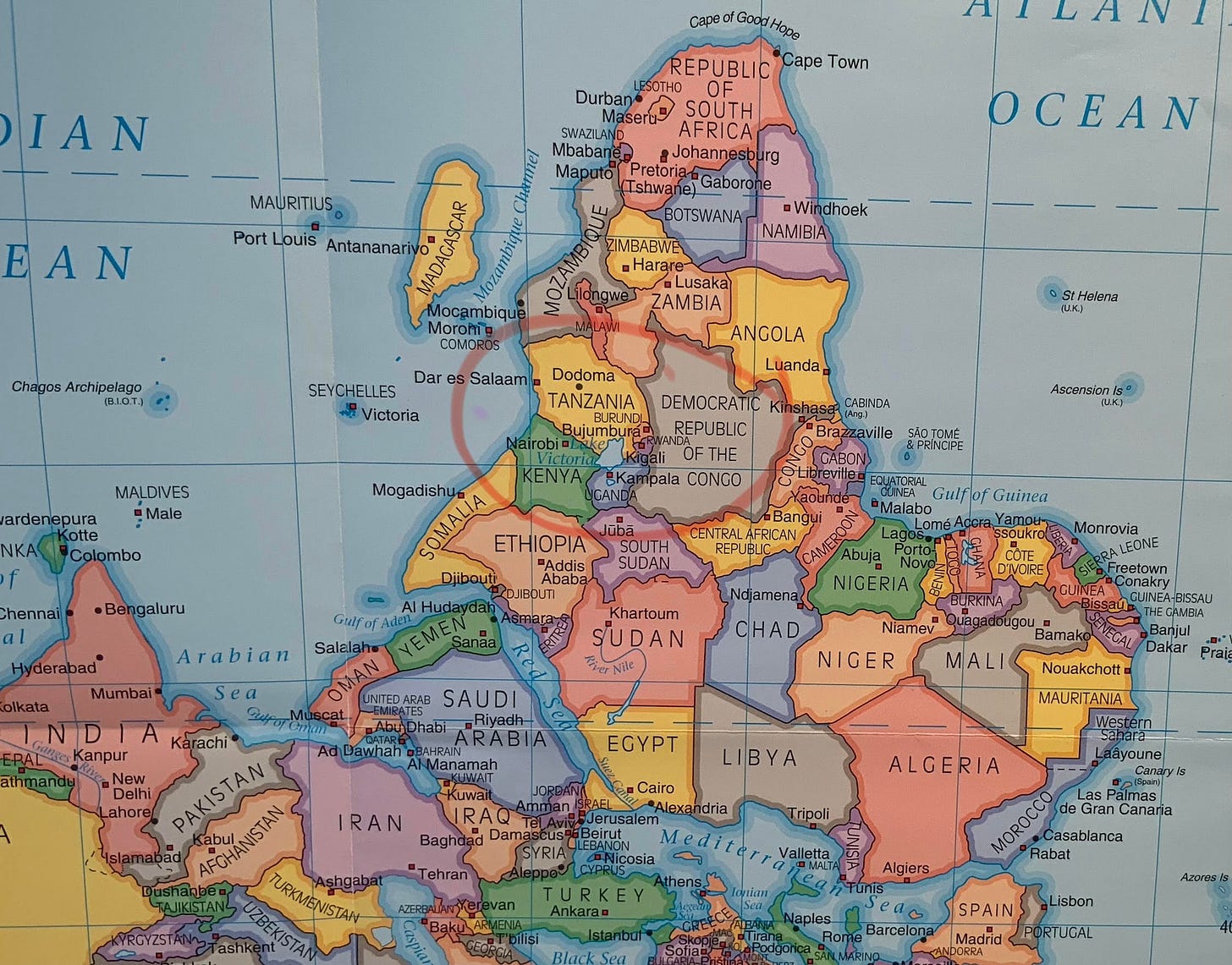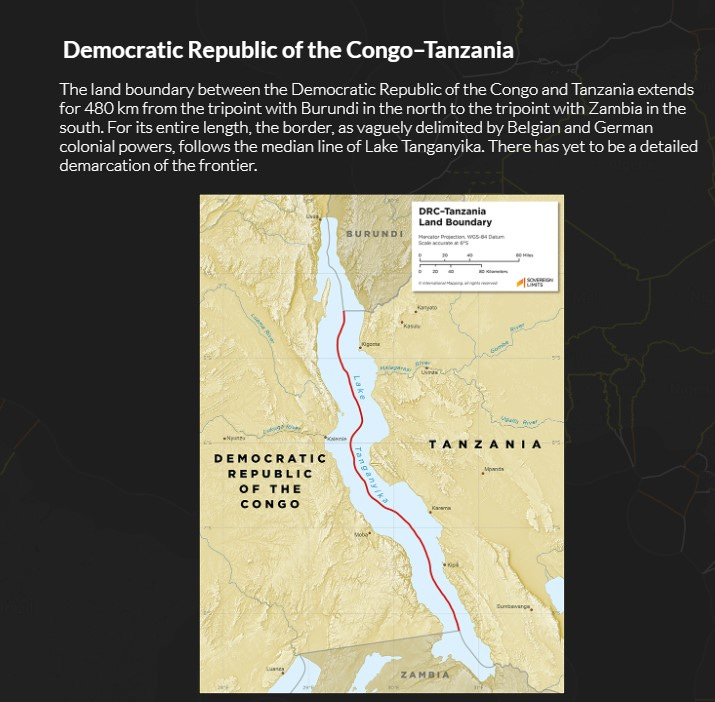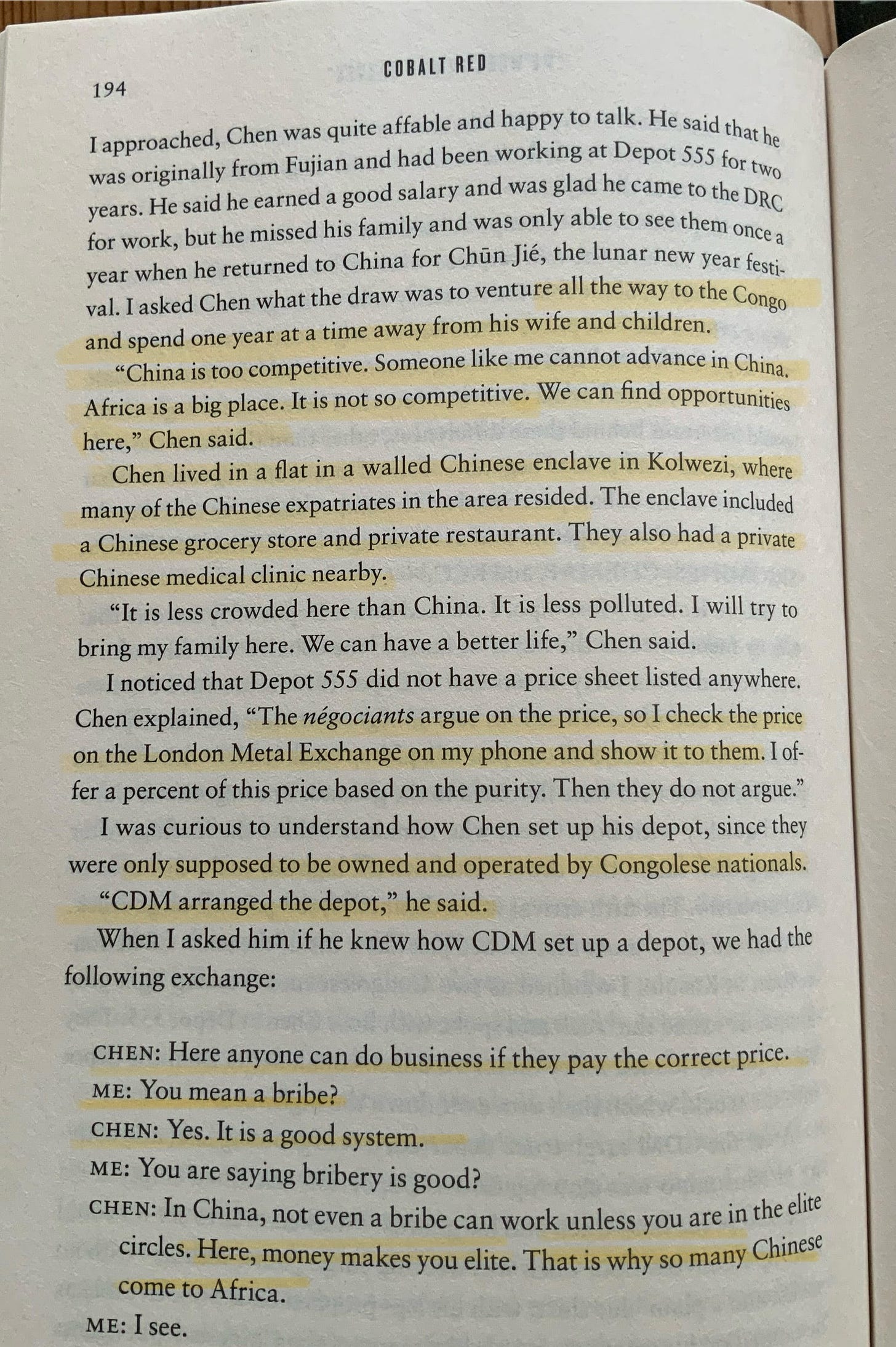African Partners in Crime: CCP promotes totalitarianism, impact investors' profits rise.
African citizens get 'free' healthcare if their CCP-trained Government leaders push for WEF/WHO targets in economic growth. What could possibly go wrong?
I’ve been investigating the impact investor Legatum’s portfolio (see my numerous previous posts on this topic), and it is often the African countries like Rwanda and Tanzania that form the focus of their asset management attention. This extract from a recent article explains one reason why:
Africa’s financial landscape is undergoing a seismic shift driven by the rapid ascent of digital banking. This technological revolution is reshaping conventional banking practices and raising the potential to address a pressing challenge: financial exclusion. As illuminated by the World Bank’s Global Findex Report, Sub-Saharan Africa has an alarmingly low 55% of adults with access to formal banking, in contrast to the global average of 76%. Empowered by advanced technologies and widespread mobile connectivity, digital banking is positioned as a solution to bridge this divide through accessible, convenient, and affordable financial services. However, as its influence grows, it is imperative to critically assess whether digital banking authentically fulfills its pledge of inclusivity or inadvertently perpetuates the pre-existing disparities within the banking sector. writes Legatum MIT ‘Fellow’, Khadija Ba (my emphasis).
And one way of ‘encouraging’ citizens to participate in BigTech surveillance (and therefore control) of personal finances, is through convenient (aka coercive) strategies connected to their health and wellbeing - eg one is called the “Wellness App”. The Gates Foundation (under Gavi, Mastercard and other ‘partners’) has a long history of exploiting African countries’ citizens to test drugs and tech, And the covid era only accelerated that trend.
Use of facial recognition software, with genetic info linked to an individual’s ID and finances is gaining momentum. Recently DNA samples from members of China’s ethnic minorities were collected on a mandatory basis and then used in research, prompting numerous academic papers to be rescinded. European researchers blamed the CCP for ethical failures of informed consent. But this practice continues unabated in captured institutions and can be exploited by those impact investors like Legatum seeking metadata for corporate purposes.
So which countries are particularly ‘exploitable’ by globalists driven to carry on these practices and can we learn anything from those projects that will give us an advantage in these challenging times ahead?
Reading Prof Siddharth Kara’s book Cobalt Red had many implications. (You can read my review of that book on this post). First of all, it made me realise the political storm about the instability in the control of borders between these African countries, which have multiple valuable ‘resources’ - both inert and sentient.
Secondly, Cobalt-rich land of the Democratic Republic of Congo (DRC) shares a border with (relatively resource-poor) Rwanda (currently in the UK news for ‘investment’ agreements in refugee services). And Tanzania is under the Public Private Partnership (PPP) impact investment spotlight by philanthropaths like the Bill and Melinda Gates Foundation for reasons like this:
What was clear from Kara’s research (and not many people have been careful and brave enough to get as close as he did to those toxic DRC mines), was the power and control that the Chinese Communist Party (CCP) has over the land and its poverty-stricken and exploited people. The tragic irony is really brought home by the fact that many DRC citizens rarely have access to clean drinking water or power, whereas the forced lethal human slavery - including of children - is serving the capitalistic greed of the BigTech virtual devices on which we all rely (this device too).
This one-page excerpt from Kara’s book provides a good example of one of the Chinese men living and working in the DRC cobalt industry:
It was ten years ago when online systems were set-up by PPPs between African countries like the DRC and Tanzania that claimed to try to address the smuggling, money laundering and customs-clearance problems.
“…the system will also link in with other stakeholders like shipping lines and ports authorities to speed up goods clearing processes, while banks will also be joined to facilitate quick payment of customs fees and duties.” [said a spokesman at the time].
How convenient. But looking at the geo-political problems (eg those highlighted in the border diagram/map above), it’s probably no surprise that the ‘illicit trading’ has only got worse since then:
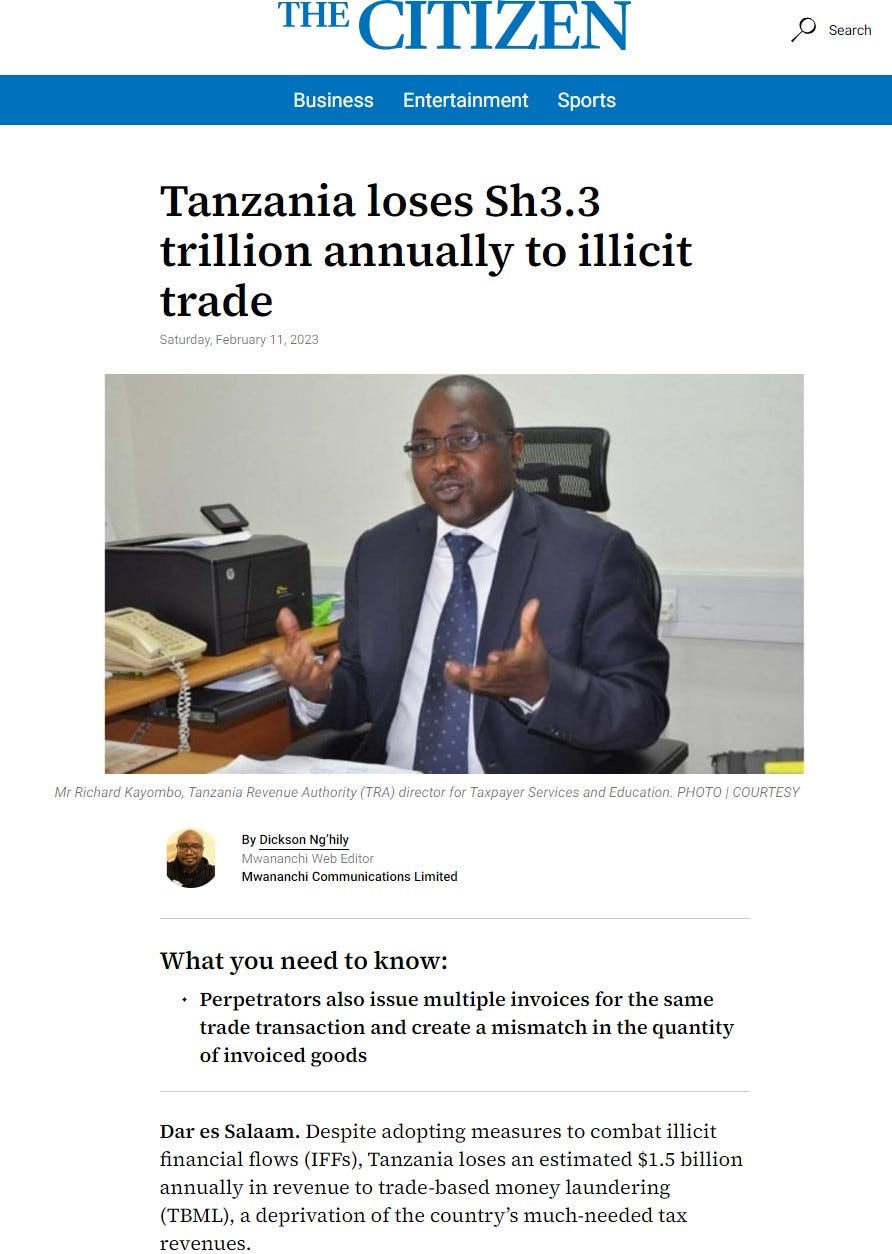
Some readers may remember that the President of Tanzania, John Magufuli, undoubtedly annoyed the globalists by dismissing the idea of national lockdowns for his country and sensibly making fun of the country's coronavirus testing facilities, saying he had “secretly sent samples of papaya and goat and that they came out positive.” He was a highly-qualified chemist and in March 2021 he ‘died suddenly’ apparently of heart failure, aged only 61. Vice President Samia Suluhu Hassan has replaced him, with apparently a ‘very different leadership style’.
Maybe as a result of this change in leadership, soon afterwards, in April 2022, the Mwalimu Nyerere Leadership School (MNLS) opened in Tanzania. This is the fruition of a massive, long-running project - an educational institute that is a partnership between the CCP and the (decades-old) ruling [uni]parties of pseudo-democracies Tanzania, Mozambique, Namibia, Angola, South Africa and Zimbabwe. (actually Rwanda would fit in well with these countries, too). Look again at my photo of my African map at the start of this post - you’ll see the geopolitical relevance of these countries’ participation.
As this important investigation from Axios points out, usually the CCP relies upon strategic leaders taking up invitations to visit Beijing for an ‘educational experience’. That hospitality presumably means an agreement is signed between those attendees that prevents any Human Rights abuses by the CCP from being discussed in public. But now the CCP can go direct, bypassing that bureaucracy: it knows that indoctrination and winning hearts and minds is more effective than any military coup.
After all, our Western democracies are dead in the water anyway, right?
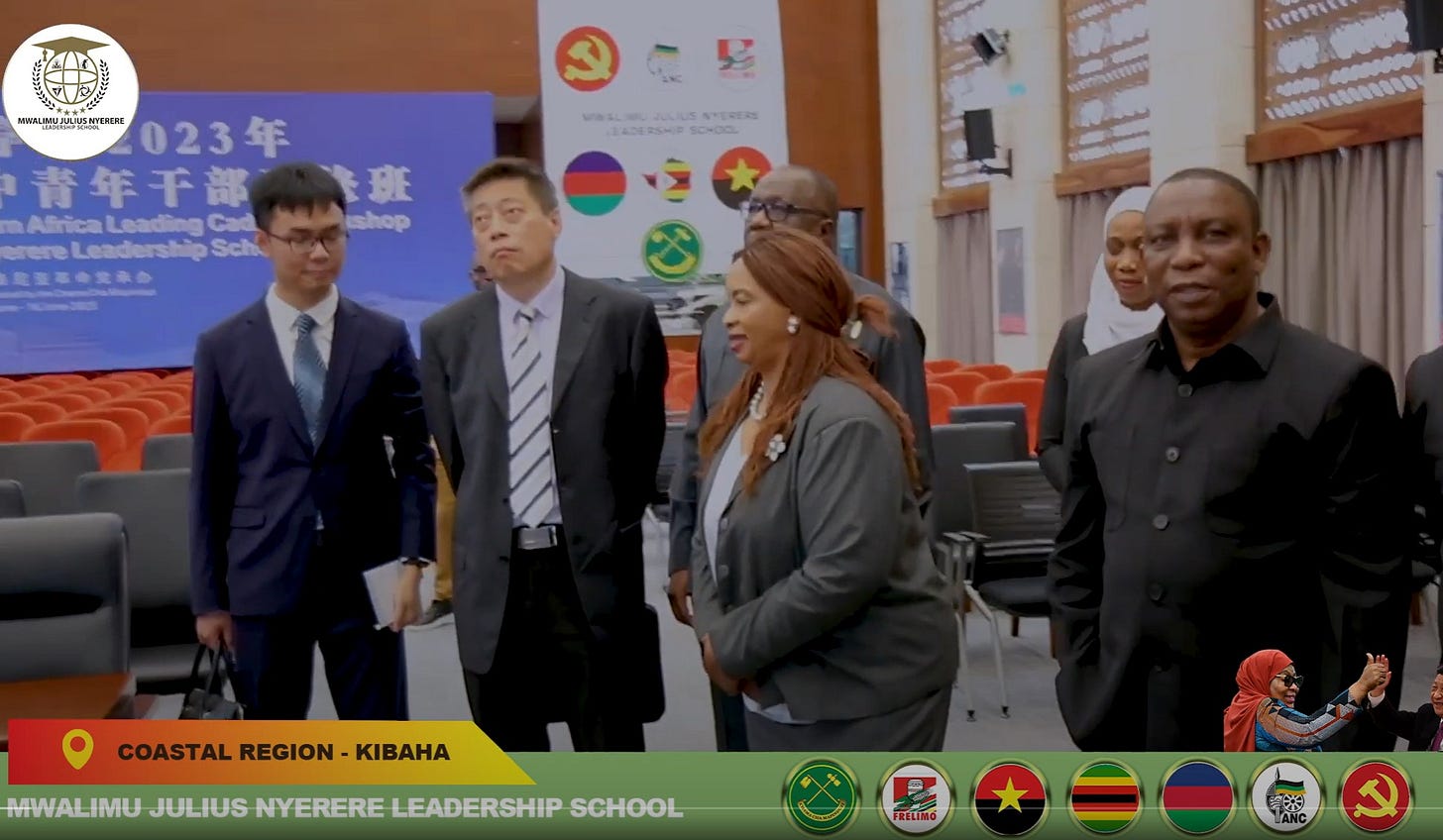
And as I have pointed out elsewhere, universities worldwide, especially those based in the Five Eyes countries, like here in the ‘phantom eye’ that is New Zealand, have ‘partnered’ with the CCP to heavily invest in outreach campuses, or ‘sino-foreign cooperative universities’ as they are called, inside China. And let’s not forget, it was Rockefeller who initially set up educational agreements with China over a century ago. This is the long game.
According to the Gates Foundation website, Tanzania has been awarded the most Gates funding of any other country, after the USA. Lucky them. I didn’t bother to add-up all the US$billions involved, but one grant caught my eye at over US$4million for ‘malaria vaccine research’, c/o Ifakara Health Inst in Dar es Salaam. It won’t be any surprise to learn the financial partners of this institution are the same metadata collectors for the UN, World Bank and WHO. I wonder where the data from that research will end up?
Apparently the CCP-funded Tanzania MNLS runs a mandatory course on Xi Jinping Thought, and I’d love to see the content and resources provided for that, especially for the special courses for ‘youth’ aimed at priming future leaders. But looking at their YouTube presentations, these courses haven’t so far been well-presented nor well-subscribed (does the CCP offer scholarships to attend?)…
For those interested in this idea, there’s a good summary of what this course may include here (20 mins):
In 2020, Tanzania’s government enforced mandatory requirements for all phone users to register their SIM cards. Apparently this policy was aimed at reducing text scams and authorities promised police could track offenders and prevent crime. Speaking in April 2022, Information Minister Nape Nnauye reported that 100% of SIM cards in Tanzania are now biometrically registered. Eeeek.
As if that wasn’t bad enough, a quick look at one of Tanzania’s largest Higher Education institutions, Mzumbe University, shows how they are partnered with various BigPharma to provide (eg) a Masters in ‘Health Monitoring & Assessment’ after establishing a need for it in Tanzania (oh really?). The University of California is involved. There’s even a PhD scholarship available at Mzumbe Uni that is part-funded by Davos BioSciences via the Kuhne Foundation in Switzerland is collected DNA samples and claim:
The goal is personalized medicine, where the treatment responds precisely to the specific circumstances and requirements of each individual patient.
Coincidentally, the Kuhne Foundation just opened a new office in Dar Es Salaam.
Last year, Tanzania, scored a very low of 128 out of a total of 167 countries on Legatum’s ‘Prosperity Index’, for health and wellbeing. So it would seem the $millions incoming from Gates and CCPs investment recently, the only place is up? Good news for the Globalists, bad news for the humble citizens who want to retain their language, culture, personal details and local currencies.
However, tragedy struck in severe floods at the end of last year, which killed many residents. This illustrates how fragile these developing countries are without proper infrastructure. Keen impact investors maybe able to measure and monitor all elements of peoples’ everyday lives via free smart phones and apps for their own modelling purposes. But when it comes to practical matters of getting to and from school or work, it seems that funding for roads, drainage and secure housing is less of a priority.
It takes time to research and write these articles. Help raise awareness of the topics raised in this post - please share, like and comment.




